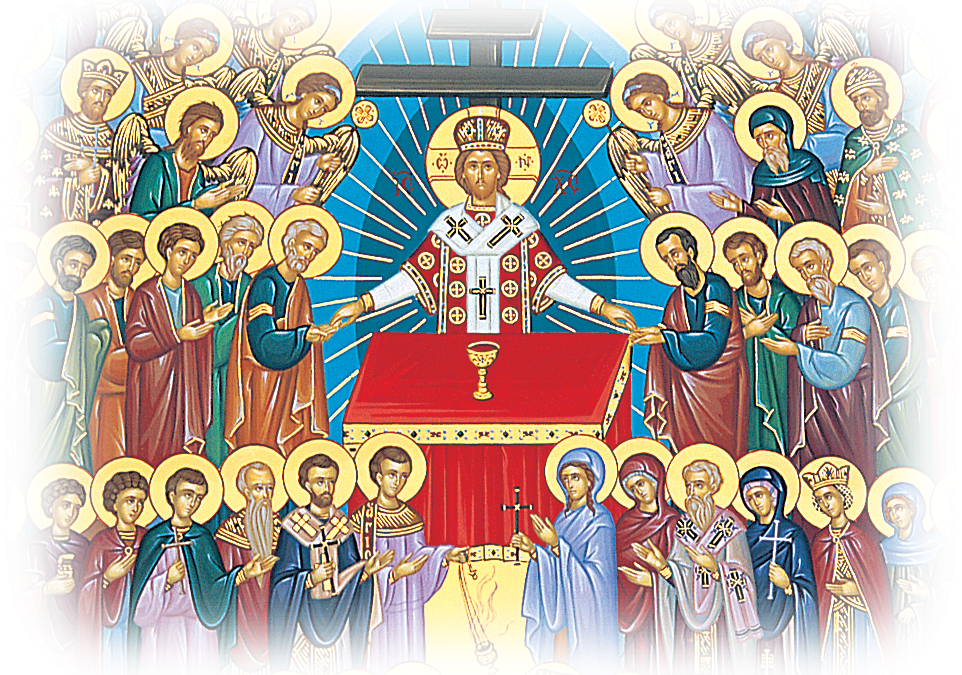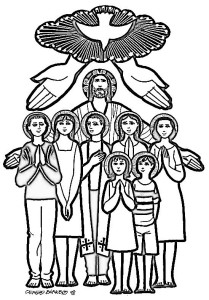CALLED TO BE SAINTS
On November 1 of every year, Christians celebrate joyfully the Feast of All Saints: the canonized and beatified by our Holy Mother Church and the (not just multitude but) megatude of anonymous saints who lived a holy life, including members of our families, especially our mothers. On the eleventh month of every year, we are reminded of our vocation to holiness.
Vatican II underlines that all Christians are called to holiness, that is, to the fullness of Christian life and to the perfection of charity. (Cf. Vatican II, Lumen Gentium, LG, 40; Catechism of the Catholic Church, CCC, 2013)
Holiness is loving union with God. For us Christians, holiness is loving union with God the Father, through Jesus Christ the Son of God, and in the Holy Spirit, our Advocate and Consoler who is the love of the Father and the Son. Loving union with Christ is called “mystical union, because it participates in the mystery of Christ through the sacraments – ‘the holy mysteries’ – and, in Him, in the mystery of the Most Holy Trinity.†All Christians are called to the mystical union with Christ, although only some receive special graces or extraordinary signs of the mystical life (CCC 2014).
The Holy Spirit, the sanctifier, is the agent of holiness. To Him, holiness is appropriated. (See LG, chapter V). The union with God is union of love with God (vertical dimension). It is also union of love with all neighbors (horizontal dimension).
Holiness is a gift of God. As free human beings, we are asked to respond freely to this gift. Our response is our availability: we have to be available like the Virgin Mary and the saints. Our available cooperation means to say yes to God, to his grace that calls us to holiness, to perfection, to happiness; in a word, to do the will of God always. Holiness entails a graceful life, a virtuous life: a life grounded on grace, practiced in virtues, above all the virtue of charity as love of God and neighbor.
The way of holiness passes through the cross. “There is no holiness without renunciation and spiritual battle†(II Tim 4). Spiritual progress implies self-denial and mortification. These lead gradually to live in the peace and joy of the Beatitudes (CCC, 2015). As Christians, we are called to be transfigured on the mountain of our life. This transfiguration, like the Transfiguration of Christ (Mt 17:1-9) gives strength to walk patiently and even joyfully our Way of the Cross.
St. Robert’s father told him: “Son, the only mistake we make in life is not to be a saint.†Indeed, as French convert Leon Bloy says, “There is sadness, only one: the sadness of not being a saint.†Bloy asked himself: “Is it hard to be a saint?†His answer: “No, just one step beyond mediocrity and you are a saint.†Well, perhaps, a few steps!
How to become a saint? By the sacrament of Baptism we become holy in our being as Christians. By our practice of faith we become holy and holier in our life. St. Paul advises us: Live “as is proper for God’s holy people†(Eph 5:3); be clothed with “compassion, kindness, humility, gentleness and patience†(Col 3:12); do the will of God in all things, even – like Jesus – by being “obedient unto death, even to death on the cross†(Phil 2:7-8).
We become saints by being authentic followers of Jesus Christ, the Holy One. Jesus is our way of holiness, and his virtuous life, the path of holiness. The practice of virtues make us holy and happy. Following Jesus, we imitate his prayerful, merciful and selfless life, his boundless love for all, in particular the poor, sick and abandoned. With God’s grace and love, we try to love God and neighbor as Christ loves us (cf. Jn 13:34; LG 42).
Holiness is one: loving union with Christ in the Church, which is holy. However the paths of holiness are many and each one is called to follow the best path for him or her, that is, his or her personal vocation. A single person, a married couple, a religious woman, a priest or a cardinal are all called by the Lord to imitate him essentially in the same way and individually according to the specific path each one is called to follow Jesus. We remember always that all the saints, headed by Mary who is above all saints, point to Jesus. St. Louis-Marie Grignion de Montfort, a great devotee of Our Lady writes: “If you call Mary, the echo is Jesus.â€
Let us be devoted to the Blessed Trinity. Let us be good children of Mary our Mother. Let us venerate the saints of our devotion and imitate their virtues. Let us realize that according to the tradition of the Church guardian angels protect us when facing dangers, and intercede for us before God.
May Jesus, Mary and Joseph, and the saints of our personal devotion accompany us on the journey of life to heaven – to a life in God One and Triune, in Jesus, in the company of Mary and the saints and our family and friends, and the whole company of heaven!
Hard to be a saint? Just a few steps beyond mediocrity. With God’s grace, we try to journey always with steps of love!
(Published by O Clarim, October 23, 2015)
FAUSTO GOMEZ, OP


